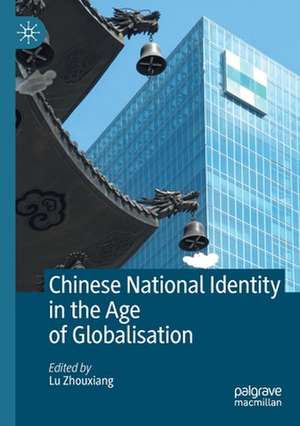Chinese National Identity in the Age of Globalisation
Editat de Lu Zhouxiangen Limba Engleză Paperback – 4 iun 2021
| Toate formatele și edițiile | Preț | Express |
|---|---|---|
| Paperback (1) | 943.97 lei 6-8 săpt. | |
| Springer Nature Singapore – 4 iun 2021 | 943.97 lei 6-8 săpt. | |
| Hardback (1) | 947.42 lei 6-8 săpt. | |
| Springer Nature Singapore – 4 iun 2020 | 947.42 lei 6-8 săpt. |
Preț: 943.97 lei
Preț vechi: 1151.18 lei
-18% Nou
Puncte Express: 1416
Preț estimativ în valută:
180.71€ • 186.26$ • 152.36£
180.71€ • 186.26$ • 152.36£
Carte tipărită la comandă
Livrare economică 27 februarie-13 martie
Preluare comenzi: 021 569.72.76
Specificații
ISBN-13: 9789811545405
ISBN-10: 9811545405
Pagini: 439
Ilustrații: XXIII, 439 p. 6 illus., 5 illus. in color.
Dimensiuni: 148 x 210 mm
Greutate: 0.6 kg
Ediția:1st ed. 2020
Editura: Springer Nature Singapore
Colecția Palgrave Macmillan
Locul publicării:Singapore, Singapore
ISBN-10: 9811545405
Pagini: 439
Ilustrații: XXIII, 439 p. 6 illus., 5 illus. in color.
Dimensiuni: 148 x 210 mm
Greutate: 0.6 kg
Ediția:1st ed. 2020
Editura: Springer Nature Singapore
Colecția Palgrave Macmillan
Locul publicării:Singapore, Singapore
Cuprins
Introduction: Constructing and Negotiating Chineseness in the Age of Globalisation.- Yellow Peril or Yellow Revival? Ethnicity, Race and Nation in Late Qing Chinese Utopianism (1902-1911).- Shaolin, Wuxia Novels, Kung Fu Movies and National Identity.- Social Network Service Platforms and China’s Cyber Nationalism in the Web 2.0 Age.- Fostered Idols and Chinese Identity.- Chinese National Identity and National Image in the Age of Globalisation.- A New Chinese National Identity: The Role of Nationalism in Chinese Foreign Policy.- Identity Narratives in China and the EU’s Economic Diplomacy – Comparing the BRI and the EU Connectivity Strategy for Asia.- Nationhood and Ethnicity at the Frontiers: A Study of Hmong Identity in Western Hunan.- ‘The People are God’ Third World Internationalism and Chinese Muslims in the Making of the National Identity in the 1950s.- From ‘Small’ to ‘Big’ Nationalism: National Identity among China’s Hui Minority in the Twenty-First Century.- The Complexity of Nationalism and National Identity in Twenty-First Century Xinjiang.- Leveraging Mega-events to Embrace Chinese National Identity: The Politics of Hong Kong’s Participation in the Beijing 2008 Olympics and the Shanghai 2010 World Expo.- The Evolution and Recognition of Self-identity in Food and Foodways of the Overseas Chinese.- Temples and Huiguan: Negotiating Chineseness in Ho Chi Minh City.- National identity, Religious Identity and Their Impacts on Subjective Well-being – A Case Study on Chinese Catholics in Ireland.- Identity Reconstruction of Chinese Migrant Women in Ireland.
Notă biografică
Lu Zhouxiang is Lecturer in Chinese Studies within the School of Modern Languages, Literatures and Cultures at Maynooth University, Maynooth, Ireland. His main research interests are Chinese history, nationalism, national identity, Chinese martial arts and China’s sport policy and practice.
Textul de pe ultima copertă
Written by a team of international scholars from China, Germany, Ireland, New Zealand and the UK, this book provides interdisciplinary studies on the construction and transformation of Chinese national identity in the age of globalisation. It addresses a wide range of issues central to national identity in the context of Chinese culture, politics, economy and society, and explores a diverse set of topics including the formation of an embryonic form of national identity in the late Qing era, the influence of popular culture on national identity, globalisation and national identity, the interaction and discourse between ethnic identity and national identity, and identity construction among overseas Chinese. It highlights the latest developments in the field and offers a distinctive contribution to our knowledge and understanding of national identity.
Caracteristici
Examines the transformation of Chinese national identity in the era of globalisation
Addresses issues central to national identity in the context of Chinese culture, politics and society, including ethnic identity
Considers the birth of Chinese national identity in the late Qing era and the influence of popular culture on national identity
Addresses issues central to national identity in the context of Chinese culture, politics and society, including ethnic identity
Considers the birth of Chinese national identity in the late Qing era and the influence of popular culture on national identity
